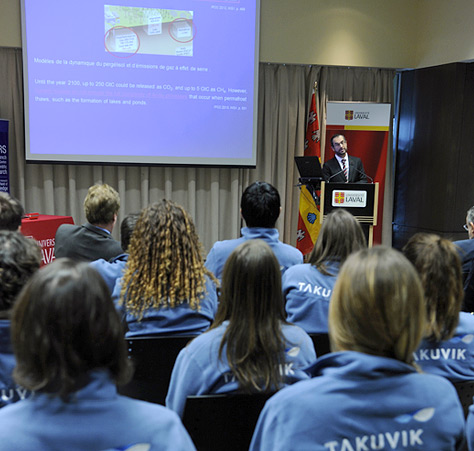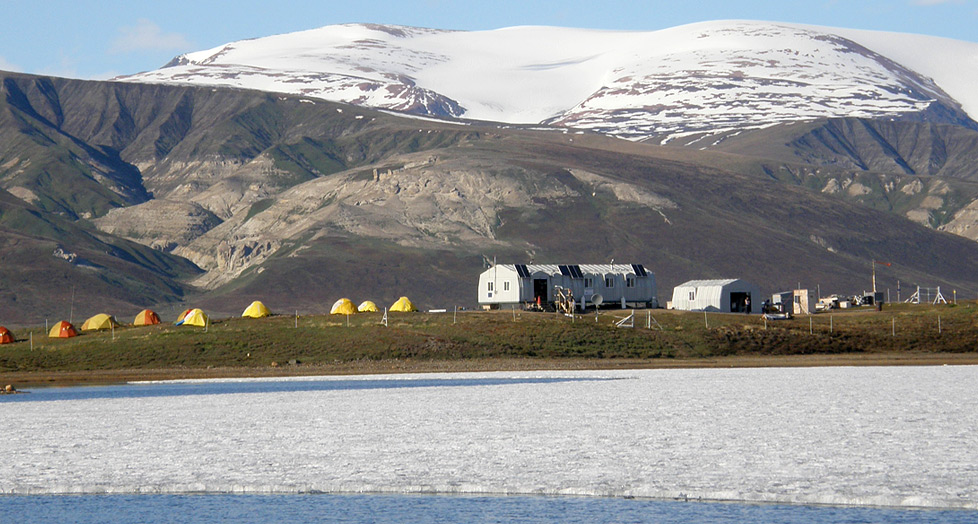Outreach
Educative program
General presentation
The people most directly affected by Arctic warming and by permafrost thaw are the Inuits. Among other impacts, they are subjected to coastal erosion that threatens their villages and to the modification of ecosystems and animal migration and therefore hunting patterns. The research we propose will be for the most part based around their villages and it is therefore important that they be informed of our progress and conclusions. Even better, they could become actors in this research. Inuits are there permanently and can be trained to make observations. They can also be trained to operate instruments and make measurements in particular of snow properties over the course of a whole winter season. We therefore propose to directly interest and involve Inuits in Umiujaq in permafrost research by:
1 Funding a research professional at Université Laval to spend 6 months over an 18 months period interacting with the school at Umiujaq and directing a research project in the Vallée-des-trois, near Umiujaq.
2 Purchasing instruments for this research. Some instruments will be placed permanently in the soil and snow to monitor temperature and soil water content. Others will be used to measure snow physical properties in winter: density and thermal conductivity, and soil humidity and thermal conductivity in summer.
3 Preparing a website specifically addressing Inuit concerns and presenting the research and their conclusions to other Inuit communities to encourage them to become partners in research taking place in their villages. The website will also encourage other scientists working in the North to interact more closely with Inuit communities.


Proposed research
Understanding the evolution of snow properties requires the continuous monitoring of physical variables such as density and thermal conductivity. However, variables such as density cannot be monitored automatically. Since a scientist cannot be permanently present on site, involving locals is an alternate solution. Teachers at the Umiujaq school are eager to involve their students in research projects and we propose to work with them to train their students in snow observations. We will teach them to observe snow stratigraphy and perform density and thermal conductivity measurements. To help them be aware of the complex interactions between snow, climate, vegetation and permafrost, we will also involve them in the monitoring of soil temperature and water content in several ecosystems: herb tundra, low and high shrub tundra and forest-tundra. We will have them install sensors in the soil at 5 depths, so they can record the evolution of the temperature profile as a function of ecosystem type. Such training is time-consuming and will require the hiring of a research professional, who will spend 6 months over an 18 months period interacting with the school and students.
The project will start in September 2015. The research professional, hired for training in June 2015, will help the students set up the temperature and water content instruments and explain the whole project to the school. A trip will be made in December to train the students in snow work. Another trip will be done in March 2016 to assist in the continuation of the snow work. At the end of the school year in June, the data from the soil sensors will be downloaded and preliminary conclusions will be drawn from the snow and soil data. In September 2016, a final trip will be done to download the summer data and to present the conclusions of the work.
A website summarizing the work will be set up with the help of a website technician, in collaboration with the research professional. The site will be advertized first to the Inuit communities, then to the scientists working in the North and finally to the general public. This work will produce the first continuous monitoring of snow properties as a function of ecosystem type in the subarctic. We expect that a specific scientific publication can be written from the results, with an Inuit school team as first author.
